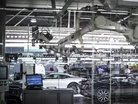Aston Martin’s £500mn trade deal shows the need for domestic supply chain investment

Luxury sports car manufacturer Aston Martin has announced a £500mn, five-year investment and trade deal with Japan.
The announcement came from Aston Martin CEO and President Andy Palmer during his visit to Japan with British Prime Minister Theresa May as part of a UK delegation.
The agreement will see £400mn of exports coming from the Gaydon, Warwick and St Athan, South Wales Plants, as well as the overseas creation of a luxury office in Japan that will act as the company’s regional headquarters.
“As the world’s second largest luxury car market, Japan is key to our future plans as we completely revitalise and expand our product portfolio under our Second Century plan. We have long enjoyed a loyal following from Japanese customers and the public alike, with our new dealership in Tokyo set to become our largest worldwide by volume,” said Palmer.
See Also:
-
Chinese automaker Chery not considering acquisitions to bolster overseas growth
-
Renault-Nissan Alliance agrees electric car partnership with Dongfeng Motor Group
-
Ford in discussions with Anhui Zotye over joint electric car venture
The company regards the deal as significantly important in providing access to the luxury car market of Japan, something that Professor Nigel Driffield of Warwick Business School believes is a demonstration of the global success of the Aston Martin brand.
“This deal is further evidence of the success of this global brand, and the increased dynamism at Aston Martin under its present leadership,” he said.
“With a strong UK production base, this type of investment abroad, designed to support exports rather than support foreign production is unambiguously good news for its local workforce in the UK. It shows continued growth in demand for high value UK exports, something that the UK government needs to support post Brexit.”
However, with £70mn in components set to come from Japanese suppliers including Bridgestone, Denso, Mitsubishi and Yazaki, Driffield signals the need for the company to improve its UK supplier base.
"The fact that components for an iconic brand such as Aston Martin still need to be sourced from overseas highlights the need for us to focus, not just on the famous brands, but on further developing their supply base locally, with an emphasis on skills, innovation and inward investment as well as exports."
Despite the deal being successful and of significance, the need for imports from Japanese suppliers should provide food for thought to the UK government in terms of its domestic industrial strategy, with some big name domestic companies remaining heavily reliant upon overseas imports.
- How Toyota is driving the course to carbon neutralitySustainability
- Panasonic switches from TVs to EVs for sustainability visionLeadership & Strategy
- How can Japan turn its ageing workforce into an advantage?Human Capital
- Japan gambles on first casino to boost tourismLeadership & Strategy



